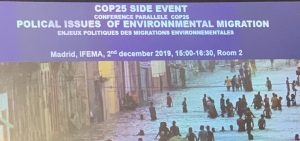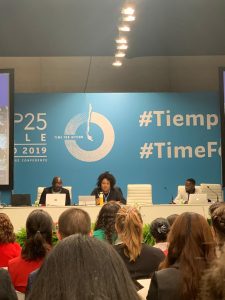Emma Hughes


Needless to say, the first day of COP25 was exciting, informative, and slightly overwhelming. Prior to the first day I had talked with Alan Spears (the person I’m reporting to at NPCA) about topics to focus on and best forms of communication between NPCA and myself. This was new territory for both of us seeing as neither of us had been to a COP before. Our main goal was to of help inform NPCA of possible future avenues for campaigns/advocacy work but also help me develop my professional career by mixing in current interests and NPCA interests.
While the opening remarks were interesting and a great way to kickoff this unique experience, I found that the side events held a lot of excitement and filled the mix of needs both NPCA and I were looking to fulfill this week. The most notable and memorable side events, that I also reported back to Alan on were the “Global climate action: Indigenous rights, territories and resources” and “Political issues of environmental migration.” Both of these side events discussed the importance of protecting and uplifting communities most vulnerable to climate change. This pertains especially to Alan’s work with NPCA as the Senior Director of Cultural and Historical Resources, as well as my previous work with NPCA on the climate vulnerability of cultural and historical resources in the United States. We discussed via email the best ways to implement the strategies and perspectives I learned today into NPCA’s work. Additionally we both decided that a phone call at the end of the week will be helpful for both of us as we move forward from this COP.
Tomorrow I’m especially looking forward to Transforming Tourism for Climate Action. There is a strong focus on tourism embracing a low carbon pathway and ramping up ambition across all sectors in an economy. I think that this session will bring up some important perspectives on how national parks and the patrons of parks can and should play a role in addressing climate change.
Pradnya Bhandari
Today was the first day of COP and it was an interesting experience to say the least. It simultaneously was what I expected and not at all what I expected. The sheer scale and range of issues that were being introduced and discussed was astonishing. I was pleasantly surprised with how many people, from a variety of backgrounds and regions were present and passionate about the topics they were speaking on. Getting to hear these international perspectives was really eye opening to me as I primarily, and almost exclusive see things through the lens of the United States. On the flip side, I felt as if a lot of the discussions were centered around explaining the problems that exist and little time was spent on introducing innovative solutions to these problems. I also didn’t have an assignment from my client today so I capitalized on the free time to hit a wide range of topics that were different than what I expect my client to want me to track. This included attending events on topics from the ambitions at COP to developing a sustainable food system to looking at the future and what goals and targets are needed after the SDGs are needed. From all of these events there were a few words that I kept hearing and those were urgency and the need to listen to youths. I’m curious if this sense of urgency has always been the case at COPs and other UN events or if this is something that has really taken form in the past few years. All these side events highlight speakers that clearly incredibly passionate about the topic they’re working on and I want to see how this passion and information from the NGOs translate into the negotiations. As the COP progresses, I am eager to continue learning about all the various, yet symbiotic initiatives that are taking place across the world.
Zukhruf Amjad
Seeing people that have a natural inkling towards public speaking command an audience is always very exciting to me, those that can command a room with the way they stand or the way they speak is something, I’ve always considered, a very good talent to have. With this regard, two specific people really stood out today –
One was the president of Spain, Presidente del Gobierno, who started his speech by talking about how the idea of the greenhouse gas effect was initially discovered by a woman, Eunice Newton Foote. He talked about how the women were not allowed to take credit for such a discovery back at that time and he wanted to use this occasion to appreciate the work she had done. He also ended his speech by humbly giving the credit for this COP to the Chilean government, who were suppose to hold this event until the civil unrest in their country made it too difficult. The president had the crowd engrossed from the very beginning of his speech till the end, even those people who did not understand Spanish, like myself, were left feeling like the occasion was truly special.
The second time this happened was when Paul Watkinson, the chair of the SBSTA, started the opening plenary session for SBSTA by showing a picture of the Kneeling curve, a graph we have all seen many times in our classes, to make everyone understand the reason they were here and the catastrophic results that would follow if consensus on key matters such as topics of the Article 6 were not reached in the sessions that would follow the next two days. Surprisingly, he also conducted his entire session in French – another language I completely did not understand. (Whoever created those online translation options deserves a COP gold medal).
Shakes Dlamini
My first day of COP 25 was enlightening, to say the least. Today marked my first experience of a multilateral international conference hence my imagination of how COP 25 would be was very far from the truth. Firstly, the day started with a packed train ride in which a colleague and I barely squeezed ourselves in. The train was packed with COP attendants along with working-class Spanish citizens heading to their respective places of work. I had high expectations for the opening events as I thought that they would rally and charge everyone up so that they are excited for the coming next two weeks and I did not get that sentiment. However, it was really exciting to get a glimpse of what happens when different regions or countries have different reservations or opinions on certain issues. The main contention was when the Agenda for the Paris Agreement was being proposed by the COP president and it was noted that African States face special circumstances. This was followed by Honduras expressing the need for Latin American states to be also considered as facing special circumstances too which led to an extended back and forth. It was interesting to hear the back and forth from countries that supported each side and the final verdict from the President.
Hearing the concerns that African states and other developing countries have such as improvements of the technology transfer mechanisms, changing the financing modalities of the COP and Paris Agreement as well as giving attention to adaptation and loss and damage. Hearing different delegates in the African group complaining about the finance mechanisms, lack of adaptation funds and lack of direction regarding loss and damage confirmed for me the magnitude of the issues which I have been thinking about leading to the COP. The side events I attended were very informative and I felt a sense of assurance about my graduate school plans since the problems that I would like to work on in the are very real and many countries are concerned about them.
Melinda Melvin
Today was the first day of COP and I feel it’s been three days already! Today the Conference of the Parties opened, as well as the Subsidiary Body for Implementation and the Subsidiary Body for Scientific and Technical Advice. I attended the opening plenaries for each of these bodies under the Framework Convention as well as a side event on the Clean Development Mechanism. I will be tracking Article 6 at this COP which is the last remaining portion of the Paris rulebook yet to be decided. There is a lot of anticipation for this topic which covers market mechanisms to achieve the ambition of the Paris Agreement and there is hope that an agreement can be reached. Last year, the talks on this topic fell through as a few Parties blocked an agreement from being reached in the last minute. I am excited to watch as much of these negotiations as possible this week and watch international diplomacy and negotiation take place. This is also a topic that I have been following closely for the past year so I look forward to learning more about the technical aspects of this very important provision of the Paris Agreement. It is exciting to be in the room with distinguished delegates from all over the world that are committed to figuring out how to address climate change as a global community. Being here I also realize how much there is to learn and how much detail is involved in these topics related to our global response to climate change.